
In 1788, the United States Constitution went into effect as New Hampshire became the ninth state to ratify it.
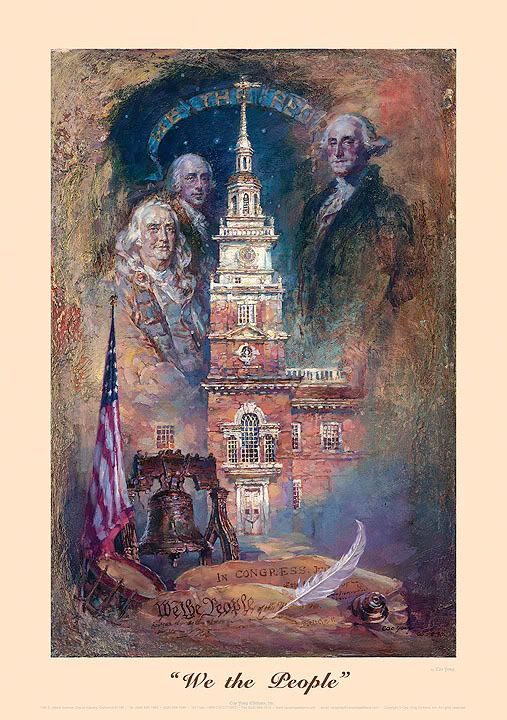
History of the United States Constitution
The United States Constitution was written in 1787, adopted in 1788, and took effect in 1789. It is still in effect and is the oldest written constitution operating in the world. The Constitution replaced the weak Articles of Confederation, in order to form a more perfect union that was strong enough to survive in a dangerous world, and yet protect the liberty of states and citizens.
http://en.wikipedia.org/wiki/History_of_the_United_States_Constitution
Michael Badnarik - The Constitution
http://constitutionpreservation.org/
Fundamental law of the U.S. federal system of government and a landmark document of the Western world. It is the oldest written national constitution in operation, completed in 1787 at the Constitutional Convention of 55 delegates who met in Philadelphia, ostensibly to amend the Articles of Confederation. The Constitution was ratified in June 1788, but because ratification in many states was contingent on the promised addition of a Bill of Rights, Congress proposed 12 amendments in September 1789; 10 were ratified by the states, and their adoption was certified on Dec. 15, 1791. The framers were especially concerned with limiting the power of the government and securing the liberty of citizens. The Constitution's separation of the legislative, executive, and judicial branches of government, the checks and balances of each branch against the other, and the explicit guarantees of individual liberty were all designed to strike a balance between authority and liberty. Article I vests all legislative powers in the Congress — the House of Representatives and the Senate. Article II vests executive power in the president. Article III places judicial power in the hands of the courts. Article IV deals, in part, with relations among the states and with the privileges of the citizens, Article V with amendment procedure, and Article VI with public debts and the supremacy of the Constitution. Article VII stipulates that the Constitution would become operational after being ratified by nine states. The 10th Amendment limits the national government's powers to those expressly listed in the Constitution; the states, unless otherwise restricted, possess all the remaining (or "residual") powers of government. Amendments to the Constitution may be proposed by a two-thirds vote of both houses of Congress or by a convention called by Congress on the application of the legislatures of two-thirds of the states. (All subsequent amendments have been initiated by Congress.) Amendments proposed by Congress must be ratified by three-fourths of the state legislatures or by conventions in as many states. Twenty-seven amendments have been added to the Constitution since 1789. In addition to the Bill of Rights, these include the 13th (1865), abolishing slavery; the 14th (1868), requiring due process and equal protection under the law; the 15th (1870), guaranteeing the right to vote regardless of race; the 17th (1913), providing for the direct election of U.S. senators; the 19th (1920), instituting women's suffrage, and the 22nd (1951), limiting the presidency to two terms. See also civil liberty; commerce clause; Equal Rights Amendment; establishment clause; freedom of speech; judiciary; states' rights.
http://www.answers.com/topic/united-states-constitution?cat=biz-fin
United States Constitution
http://en.wikipedia.org/wiki/United_States_Constitution
The United States Constitution is the supreme law of the United States of America. It was adopted in its original form on September 17, 1787 by the Constitutional Convention in Philadelphia, Pennsylvania, and later ratified by the people in conventions in each state in the name of "We the People."[1][2] The Constitution has a central place in American law and political culture.[3] The U.S. Constitution is the oldest written national constitution except possibly for San Marino's Statutes of 1600, whose status as a true constitution is disputed by scholars. An engrossed copy of the document is on display at the National Archives in Washington, D.C.
June 21, 1788: U.S. Constitution ratified
http://www.history.com/media.do?action=clip&id=tdih_jun21_broadband
US Constitution
http://www.usconstitution.com/
The US Constitution Timeline
http://www.usconstitution.net/consttime.html
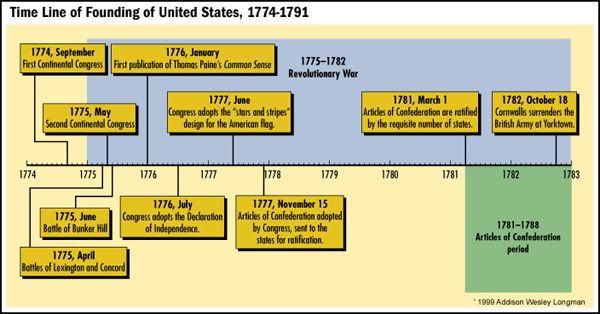
The oldest federal constitution in existence was framed by a convention of delegates from twelve of the thirteen original states in Philadelphia in May 1787, Rhode Island failing to send a delegate. George Washington presided over the session, which lasted until September 17, 1787. The draft (originally a preamble and seven Articles) was submitted to all thirteen states and was to become effective when ratified by nine states. It went into effect on the first Wednesday in March 1789, having been ratified by New Hampshire, the ninth state to approve, on June 21, 1788. The states ratified the Constitution in the following order:
http://www.factmonster.com/ipka/A0101025.html
Delaware December 7, 1787
Pennsylvania December 12, 1787
New Jersey December 18, 1787
Georgia January 2, 1788
Connecticut January 9, 1788
Massachusetts February 6, 1788
Maryland April 28, 1788
South Carolina May 23, 1788
New Hampshire June 21, 1788
Virginia June 25, 1788
New York July 26, 1788
North Carolina November 21, 1789
Rhode Island May 29, 1790
THE UNITED STATES CONSTITUTION
http://www.house.gov/paul/constitution.html
We the People of the United States, in Order to form a more perfect Union, establish Justice, insure domestic Tranquility, provide for the common defence, promote the general Welfare, and secure the Blessings of Liberty to ourselves and our Posterity, do ordain and establish this Constitution for the United States of America.
Article. I.
Section 1.
All legislative Powers herein granted shall be vested in a Congress of the United States, which shall consist of a Senate and House of Representatives.
Section. 2.
Clause 1: The House of Representatives shall be composed of Members chosen every second Year by the People of the several States, and the Electors in each State shall have the Qualifications requisite for Electors of the most numerous Branch of the State Legislature.
Clause 2: No Person shall be a Representative who shall not have attained to the Age of twenty five Years, and been seven Years a Citizen of the United States, and who shall not, when elected, be an Inhabitant of that State in which he shall be chosen.
Clause 3: Representatives and direct Taxes shall be apportioned among the several States which may be included within this Union, according to their respective Numbers, which shall be determined by adding to the whole Number of free Persons, including those bound to Service for a Term of Years, and excluding Indians not taxed, three fifths of all other Persons. (See Note 2) The actual Enumeration shall be made within three Years after the first Meeting of the Congress of the United States, and within every subsequent Term of ten Years, in such Manner as they shall by Law direct. The Number of Representatives shall not exceed one for every thirty Thousand, but each State shall have at Least one Representative; and until such enumeration shall be made, the State of New Hampshire shall be entitled to chuse three, Massachusetts eight, Rhode-Island and Providence Plantations one, Connecticut five, New-York six, New Jersey four, Pennsylvania eight, Delaware one, Maryland six, Virginia ten, North Carolina five, South Carolina five, and Georgia three.
Clause 4: When vacancies happen in the Representation from any State, the Executive Authority thereof shall issue Writs of Election to fill such Vacancies.
Clause 5: The House of Representatives shall chuse their Speaker and other Officers; and shall have the sole Power of Impeachment.
Section. 3.
Clause 1: The Senate of the United States shall be composed of two Senators from each State, chosen by the Legislature thereof, (See Note 3) for six Years; and each Senator shall have one Vote.
Clause 2: Immediately after they shall be assembled in Consequence of the first Election, they shall be divided as equally as may be into three Classes. The Seats of the Senators of the first Class shall be vacated at the Expiration of the second Year, of the second Class at the Expiration of the fourth Year, and of the third Class at the Expiration of the sixth Year, so that one third may be chosen every second Year; and if Vacancies happen by Resignation, or otherwise, during the Recess of the Legislature of any State, the Executive thereof may make temporary Appointments until the next Meeting of the Legislature, which shall then fill such Vacancies. (See Note 4)
Clause 3: No Person shall be a Senator who shall not have attained to the Age of thirty Years, and been nine Years a Citizen of the United States, and who shall not, when elected, be an Inhabitant of that State for which he shall be chosen.
Clause 4: The Vice President of the United States shall be President of the Senate, but shall have no Vote, unless they be equally divided.
Clause 5: The Senate shall chuse their other Officers, and also a President pro tempore, in the Absence of the Vice President, or when he shall exercise the Office of President of the United States.
Clause 6: The Senate shall have the sole Power to try all Impeachments. When sitting for that Purpose, they shall be on Oath or Affirmation. When the President of the United States is tried, the Chief Justice shall preside: And no Person shall be convicted without the Concurrence of two thirds of the Members present.
Clause 7: Judgment in Cases of Impeachment shall not extend further than to removal from Office, and disqualification to hold and enjoy any Office of honor, Trust or Profit under the United States: but the Party convicted shall nevertheless be liable and subject to Indictment, Trial, Judgment and Punishment, according to Law.
Section. 4.
Clause 1: The Times, Places and Manner of holding Elections for Senators and Representatives, shall be prescribed in each State by the Legislature thereof; but the Congress may at any time by Law make or alter such Regulations, except as to the Places of chusing Senators.
Clause 2: The Congress shall assemble at least once in every Year, and such Meeting shall be on the first Monday in December, (See Note 5) unless they shall by Law appoint a different Day.
Section. 5.
Clause 1: Each House shall be the Judge of the Elections, Returns and Qualifications of its own Members, and a Majority of each shall constitute a Quorum to do Business; but a smaller Number may adjourn from day to day, and may be authorized to compel the Attendance of absent Members, in such Manner, and under such Penalties as each House may provide.
Clause 2: Each House may determine the Rules of its Proceedings, punish its Members for disorderly Behaviour, and, with the Concurrence of two thirds, expel a Member.
Clause 3: Each House shall keep a Journal of its Proceedings, and from time to time publish the same, excepting such Parts as may in their Judgment require Secrecy; and the Yeas and Nays of the Members of either House on any question shall, at the Desire of one fifth of those Present, be entered on the Journal.
Clause 4: Neither House, during the Session of Congress, shall, without the Consent of the other, adjourn for more than three days, nor to any other Place than that in which the two Houses shall be sitting.
Section. 6.
Clause 1: The Senators and Representatives shall receive a Compensation for their Services, to be ascertained by Law, and paid out of the Treasury of the United States. (See Note 6) They shall in all Cases, except Treason, Felony and Breach of the Peace, beprivileged from Arrest during their Attendance at the Session of their respective Houses, and in going to and returning from the same; and for any Speech or Debate in either House, they shall not be questioned in any other Place.
Clause 2: No Senator or Representative shall, during the Time for which he was elected, be appointed to any civil Office under the Authority of the United States, which shall have been created, or the Emoluments whereof shall have been encreased during such time; and no Person holding any Office under the United States, shall be a Member of either House during his Continuance in Office.
Section. 7.
Clause 1: All Bills for raising Revenue shall originate in the House of Representatives; but the Senate may propose or concur with Amendments as on other Bills.
Clause 2: Every Bill which shall have passed the House of Representatives and the Senate, shall, before it become a Law, be presented to the President of the United States; If he approve he shall sign it, but if not he shall return it, with his Objections to that House in which it shall have originated, who shall enter the Objections at large on their Journal, and proceed to reconsider it. If after such Reconsideration two thirds of that House shall agree to pass the Bill, it shall be sent, together with the Objections, to the other House, by which it shall likewise be reconsidered, and if approved by two thirds of that House, it shall become a Law. But in all such Cases the Votes of both Houses shall be determined by yeas and Nays, and the Names of the Persons voting for and against the Bill shall be entered on the Journal of each House respectively. If any Bill shall not be returned by the President within ten Days (Sundays excepted) after it shall have been presented to him, the Same shall be a Law, in like Manner as if he had signed it, unless the Congress by their Adjournment prevent its Return, in which Case it shall not be a Law.
Clause 3: Every Order, Resolution, or Vote to which the Concurrence of the Senate and House of Representatives may be necessary (except on a question of Adjournment) shall be presented to the President of the United States; and before the Same shall take Effect, shall be approved by him, or being disapproved by him, shall be repassed by two thirds of the Senate and House of Representatives, according to the Rules and Limitations prescribed in the Case of a Bill.
Section. 8.
Clause 1: The Congress shall have Power To lay and collect Taxes, Duties, Imposts and Excises, to pay the Debts and provide for the common Defence and general Welfare of the United States; but all Duties, Imposts and Excises shall be uniform throughout the United States;
Clause 2: To borrow Money on the credit of the United States;
Clause 3: To regulate Commerce with foreign Nations, and among the several States, and with the Indian Tribes;
Clause 4: To establish an uniform Rule of Naturalization, and uniform Laws on the subject of Bankruptcies throughout the United States;
Clause 5: To coin Money, regulate the Value thereof, and of foreign Coin, and fix the Standard of Weights and Measures;
Clause 6: To provide for the Punishment of counterfeiting the Securities and current Coin of the United States;
Clause 7: To establish Post Offices and post Roads;
Clause 8: To promote the Progress of Science and useful Arts, by securing for limited Times to Authors and Inventors the exclusive Right to their respective Writings and Discoveries;
Clause 9: To constitute Tribunals inferior to the supreme Court;
Clause 10: To define and punish Piracies and Felonies committed on the high Seas, and Offences against the Law of Nations;
Clause 11: To declare War, grant Letters of Marque and Reprisal, and make Rules concerning Captures on Land and Water;
Clause 12: To raise and support Armies, but no Appropriation of Money to that Use shall be for a longer Term than two Years;
Clause 13: To provide and maintain a Navy;
Clause 14: To make Rules for the Government and Regulation of the land and naval Forces;
Clause 15: To provide for calling forth the Militia to execute the Laws of the Union, suppress Insurrections and repel Invasions;
Clause 16: To provide for organizing, arming, and disciplining, the Militia, and for governing such Part of them as may be employed in the Service of the United States, reserving to the States respectively, the Appointment of the Officers, and the Authority of training the Militia according to the discipline prescribed by Congress;
Clause 17: To exercise exclusive Legislation in all Cases whatsoever, over such District (not exceeding ten Miles square) as may, byCession of particular States, and the Acceptance of Congress, become the Seat of the Government of the United States, and to exercise like Authority over all Places purchased by the Consent of the Legislature of the State in which the Same shall be, for the Erection of Forts, Magazines, Arsenals, dock-Yards, and other needful Buildings;--And
Clause 18: To make all Laws which shall be necessary and proper for carrying into Execution the foregoing Powers, and all other Powers vested by this Constitution in the Government of the United States, or in any Department or Officer thereof.
Section. 9.
Clause 1: The Migration or Importation of such Persons as any of the States now existing shall think proper to admit, shall not be prohibited by the Congress prior to the Year one thousand eight hundred and eight, but a Tax or duty may be imposed on such Importation, not exceeding ten dollars for each Person.
Clause 2: The Privilege of the Writ of Habeas Corpus shall not be suspended, unless when in Cases of Rebellion or Invasion the public Safety may require it.
Clause 3: No Bill of Attainder or ex post facto Law shall be passed.
Clause 4: No Capitation, or other direct, Tax shall be laid, unless in Proportion to the Census or Enumeration herein before directed to be taken. (See Note 7)
Clause 5: No Tax or Duty shall be laid on Articles exported from any State.
Clause 6: No Preference shall be given by any Regulation of Commerce or Revenue to the Ports of one State over those of another: nor shall Vessels bound to, or from, one State, be obliged to enter, clear, or pay Duties in another.
Clause 7: No Money shall be drawn from the Treasury, but in Consequence of Appropriations made by Law; and a regular Statement and Account of the Receipts and Expenditures of all public Money shall be published from time to time.
Clause 8: No Title of Nobility shall be granted by the United States: And no Person holding any Office of Profit or Trust under them, shall, without the Consent of the Congress, accept of any present, Emolument, Office, or Title, of any kind whatever, from any King, Prince, or foreign State.
Section. 10.
Clause 1: No State shall enter into any Treaty, Alliance, or Confederation; grant Letters of Marque and Reprisal; coin Money; emit Bills of Credit; make any Thing but gold and silver Coin a Tender in Payment of Debts; pass any Bill of Attainder, ex post facto Law, or Law impairing the Obligation of Contracts, or grant any Title of Nobility.
Clause 2: No State shall, without the Consent of the Congress, lay any Imposts or Duties on Imports or Exports, except what may be absolutely necessary for executing it's inspection Laws: and the net Produce of all Duties and Imposts, laid by any State on Imports or Exports, shall be for the Use of the Treasury of the United States; and all such Laws shall be subject to the Revision and Controul of the Congress.
Clause 3: No State shall, without the Consent of Congress, lay any Duty of Tonnage, keep Troops, or Ships of War in time of Peace, enter into any Agreement or Compact with another State, or with a foreign Power, or engage in War, unless actually invaded, or in such imminent Danger as will not admit of delay.
Article. II.
Section. 1.
Clause 1: The executive Power shall be vested in a President of the United States of America. He shall hold his Office during the Term of four Years, and, together with the Vice President, chosen for the same Term, be elected, as follows
Clause 2: Each State shall appoint, in such Manner as the Legislature thereof may direct, a Number of Electors, equal to the whole Number of Senators and Representatives to which the State may be entitled in the Congress: but no Senator or Representative, or Person holding an Office of Trust or Profit under the United States, shall be appointed an Elector.
Clause 3: The Electors shall meet in their respective States, and vote by Ballot for two Persons, of whom one at least shall not be an Inhabitant of the same State with themselves. And they shall make a List of all the Persons voted for, and of the Number of Votes for each; which List they shall sign and certify, and transmit sealed to the Seat of the Government of the United States, directed to the President of the Senate. The President of the Senate shall, in the Presence of the Senate and House of Representatives, open all the Certificates, and the Votes shall then be counted. The Person having the greatest Number of Votes shall be the President, if such Number be a Majority of the whole Number of Electors appointed; and if there be more than one who have such Majority, and have an equal Number of Votes, then the House of Representatives shall immediately chuse by Ballot one of them for President; and if no Person have a Majority, then from the five highest on the List the said House shall in like Manner chuse the President. But in chusing the President, the Votes shall be taken by States, the Representation from each State having one Vote; A quorum for this Purpose shall consist of a Member or Members from two thirds of the States, and a Majority of all the States shall be necessary to a Choice. In every Case, after the Choice of the President, the Person having the greatest Number of Votes of the Electors shall be the Vice President. But if there should remain two or more who have equal Votes, the Senate shall chuse from them by Ballot the Vice President. (See Note 8)
Clause 4: The Congress may determine the Time of chusing the Electors, and the Day on which they shall give their Votes; which Day shall be the same throughout the United States.
Clause 5: No Person except a natural born Citizen, or a Citizen of the United States, at the time of the Adoption of this Constitution, shall be eligible to the Office of President; neither shall any Person be eligible to that Office who shall not have attained to the Age of thirty five Years, and been fourteen Years a Resident within the United States.
Clause 6: In Case of the Removal of the President from Office, or of his Death, Resignation, or Inability to discharge the Powers and Duties of the said Office, (See Note 9) the Same shall devolve on the VicePresident, and the Congress may by Law provide for the Case of Removal, Death, Resignation or Inability, both of the President and Vice President, declaring what Officer shall then act as President, and such Officer shall act accordingly, until the Disability be removed, or a President shall be elected.
Clause 7: The President shall, at stated Times, receive for his Services, a Compensation, which shall neither be encreased nor diminished during the Period for which he shall have been elected, and he shall not receive within that Period any other Emolument from the United States, or any of them.
Clause 8: Before he enter on the Execution of his Office, he shall take the following Oath or Affirmation:--"I do solemnly swear (or affirm) that I will faithfully execute the Office of President of the United States, and will to the best of my Ability, preserve, protect and defend the Constitution of the United States."
Section. 2.
Clause 1: The President shall be Commander in Chief of the Army and Navy of the United States, and of the Militia of the several States, when called into the actual Service of the United States; he may require the Opinion, in writing, of the principal Officer in each of the executive Departments, upon any Subject relating to the Duties of their respective Offices, and he shall have Power to grant Reprieves and Pardons for Offences against the United States, except in Cases of Impeachment.
Clause 2: He shall have Power, by and with the Advice and Consent of the Senate, to make Treaties, provided two thirds of the Senators present concur; and he shall nominate, and by and with the Advice and Consent of the Senate, shall appoint Ambassadors, other public Ministers and Consuls, Judges of the supreme Court, and all other Officers of the United States, whose Appointments are not herein otherwise provided for, and which shall be established by Law: but the Congress may by Law vest the Appointment of such inferior Officers, as they think proper, in the President alone, in the Courts of Law, or in the Heads of Departments.
Clause 3: The President shall have Power to fill up all Vacancies that may happen during the Recess of the Senate, by granting Commissions which shall expire at the End of their next Session.
Section. 3.
He shall from time to time give to the Congress Information of the State of the Union, and recommend to their Consideration such Measures as he shall judge necessary and expedient; he may, on extraordinary Occasions, convene both Houses, or either of them, and in Case of Disagreement between them, with Respect to the Time of Adjournment, he may adjourn them to such Time as he shall think proper; he shall receive Ambassadors and other public Ministers; he shall take Care that the Laws be faithfully executed, and shall Commission all the Officers of the United States.
Section. 4.
The President, Vice President and all civil Officers of the United States, shall be removed from Office on Impeachment for, and Conviction of, Treason, Bribery, or other high Crimes and Misdemeanors.
Article. III.
Section. 1.
The judicial Power of the United States, shall be vested in one supreme Court, and in such inferior Courts as the Congress may from time to time ordain and establish. The Judges, both of the supreme and inferior Courts, shall hold their Offices during good Behaviour, and shall, at stated Times, receive for their Services, a Compensation, which shall not be diminished during their Continuance in Office.
Section. 2.
Clause 1: The judicial Power shall extend to all Cases, in Law and Equity, arising under this Constitution, the Laws of the United States, and Treaties made, or which shall be made, under their Authority;--to all Cases affecting Ambassadors, other public Ministers and Consuls;--to all Cases of admiralty and maritime Jurisdiction;--to Controversies to which the United States shall be a Party;--to Controversies between two or more States;--between a State and Citizens of another State; (See Note 10)--between Citizens of different States, --between Citizens of the same State claiming Lands under Grants of different States, and between a State, or the Citizens thereof, and foreign States, Citizens or Subjects.
Clause 2: In all Cases affecting Ambassadors, other public Ministers and Consuls, and those in which a State shall be Party, the supreme Court shall have original Jurisdiction. In all the other Cases before mentioned, the supreme Court shall have appellate Jurisdiction, both as to Law and Fact, with such Exceptions, and under such Regulations as the Congress shall make.
Clause 3: The Trial of all Crimes, except in Cases of Impeachment, shall be by Jury; and such Trial shall be held in the State where the said Crimes shall have been committed; but when not committed within any State, the Trial shall be at such Place or Places as the Congress may by Law have directed.
Section. 3.
Clause 1: Treason against the United States, shall consist only in levying War against them, or in adhering to their Enemies, giving them Aid and Comfort. No Person shall be convicted of Treason unless on the Testimony of two Witnesses to the same overt Act, or on Confession in open Court.
Clause 2: The Congress shall have Power to declare the Punishment of Treason, but no Attainder of Treason shall work Corruption of Blood, or Forfeiture except during the Life of the Person attainted.
Article. IV.
Section. 1.
Full Faith and Credit shall be given in each State to the public Acts, Records, and judicial Proceedings of every other State. And the Congress may by general Laws prescribe the Manner in which such Acts, Records and Proceedings shall be proved, and the Effect thereof.
Section. 2.
Clause 1: The Citizens of each State shall be entitled to all Privileges and Immunities of Citizens in the several States.
Clause 2: A Person charged in any State with Treason, Felony, or other Crime, who shall flee from Justice, and be found in another State, shall on Demand of the executive Authority of the State from which he fled, be delivered up, to be removed to the State having Jurisdiction of the Crime.
Clause 3: No Person held to Service or Labour in one State, under the Laws thereof, escaping into another, shall, in Consequence of any Law or Regulation therein, be discharged from such Service or Labour, but shall be delivered up on Claim of the Party to whom such Service or Labour may be due. (See Note 11)
Section. 3.
Clause 1: New States may be admitted by the Congress into this Union; but no new State shall be formed or erected within the Jurisdiction of any other State; nor any State be formed by the Junction of two or more States, or Parts of States, without the Consent of the Legislatures of the States concerned as well as of the Congress.
Clause 2: The Congress shall have Power to dispose of and make all needful Rules and Regulations respecting the Territory or other Property belonging to the United States; and nothing in this Constitution shall be so construed as to Prejudice any Claims of the United States, or of any particular State.
Section. 4.
The United States shall guarantee to every State in this Union a Republican Form of Government, and shall protect each of them against Invasion; and on Application of the Legislature, or of the Executive (when the Legislature cannot be convened) against domestic Violence.
Article. V.
The Congress, whenever two thirds of both Houses shall deem it necessary, shall propose Amendments to this Constitution, or, on the Application of the Legislatures of two thirds of the several States, shall call a Convention for proposing Amendments, which, in either Case, shall be valid to all Intents and Purposes, as Part of this Constitution, when ratified by the Legislatures of three fourths of the several States, or by Conventions in three fourths thereof, as the one or the other Mode of Ratification may be proposed by the Congress; Provided that no Amendment which may be made prior to the Year One thousand eight hundred and eight shall in any Manner affect the first and fourth Clauses in the Ninth Section of the first Article; and that no State, without its Consent, shall be deprived of its equal Suffrage in the Senate.
Article. VI.
Clause 1: All Debts contracted and Engagements entered into, before the Adoption of this Constitution, shall be as valid against the United States under this Constitution, as under the Confederation.
Clause 2: This Constitution, and the Laws of the United States which shall be made in Pursuance thereof; and all Treaties made, or which shall be made, under the Authority of the United States, shall be the supreme Law of the Land; and the Judges in every State shall be bound thereby, any Thing in the Constitution or Laws of any State to the Contrary notwithstanding.
Clause 3: The Senators and Representatives before mentioned, and the Members of the several State Legislatures, and all executive and judicial Officers, both of the United States and of the several States, shall be bound by Oath or Affirmation, to support this Constitution; but no religious Test shall ever be required as a Qualification to any Office or public Trust under the United States.
Article. VII.
The Ratification of the Conventions of nine States, shall be sufficient for the Establishment of this Constitution between the States so ratifying the Same.
done in Convention by the Unanimous Consent of the States present the Seventeenth Day of September in the Year of our Lord one thousand seven hundred and Eighty seven and of the Independence of the United States of America the Twelfth In witness whereof We have hereunto subscribed our Names,
GO WASHINGTON--Presidt. and deputy from Virginia
[Signed also by the deputies of twelve States.]
Delaware
Geo: Read
Gunning Bedford jun
John Dickinson
Richard Bassett
Jaco: Broom
Maryland
James MCHenry
Dan of ST ThoS. Jenifer
DanL Carroll.
Virginia
John Blair--
James Madison Jr.
North Carolina
WM Blount
RichD. Dobbs Spaight.
Hu Williamson
South Carolina
J. Rutledge
Charles 1ACotesworth Pinckney
Charles Pinckney
Pierce Butler.
Georgia
William Few
Abr Baldwin
New Hampshire
John Langdon
Nicholas Gilman
Massachusetts
Nathaniel Gorham
Rufus King
Connecticut
WM. SamL. Johnson
Roger Sherman
New York
Alexander Hamilton
New Jersey
Wil: Livingston
David Brearley.
WM. Paterson.
Jona: Dayton
Pennsylvania
B Franklin
Thomas Mifflin
RobT Morris
Geo. Clymer
ThoS. FitzSimons
Jared Ingersoll
James Wilson.
Gouv Morris
Attest William Jackson Secretary
NOTES
Note 1: This text of the Constitution follows the engrossed copy signed by Gen. Washington and the deputies from 12 States. The small superior figures preceding the paragraphs designate Clauses, and were not in the original and have no reference to footnotes.
The Constitution was adopted by a convention of the States on September 17, 1787, and was subsequently ratified by the several States, on the following dates: Delaware, December 7, 1787; Pennsylvania, December 12, 1787; New Jersey, December 18, 1787; Georgia, January 2, 1788; Connecticut, January 9, 1788; Massachusetts, February 6, 1788; Maryland, April 28, 1788; South Carolina, May 23, 1788; New Hampshire, June 21, 1788.
Ratification was completed on June 21, 1788.
The Constitution was subsequently ratified by Virginia, June 25, 1788; New York, July 26, 1788; North Carolina, November 21, 1789; Rhode Island, May 29, 1790; and Vermont, January 10, 1791.
In May 1785, a committee of Congress made a report recommending an alteration in the Articles of Confederation, but no action was taken on it, and it was left to the State Legislatures to proceed in the matter. In January 1786, the Legislature of Virginia passed a resolution providing for the appointment of five commissioners, who, or any three of them, should meet such commissioners as might be appointed in the other States of the Union, at a time and place to be agreed upon, to take into consideration the trade of the United States; to consider how far a uniform system in their commercial regulations may be necessary to their common interest and their permanent harmony; and to report to the several States such an act, relative to this great object, as, when ratified by them, will enable the United States in Congress effectually to provide for the same. The Virginia commissioners, after some correspondence, fixed the first Monday in September as the time, and the city of Annapolis as the place for the meeting, but only four other States were represented, viz: Delaware, New York, New Jersey, and Pennsylvania; the commissioners appointed by Massachusetts, New Hampshire, North Carolina, and Rhode Island failed to attend. Under the circumstances of so partial a representation, the commissioners present agreed upon a report, (drawn by Mr. Hamilton, of New York,) expressing their unanimous conviction that it might essentially tend to advance the interests of the Union if the States by which they were respectively delegated would concur, and use their endeavors to procure the concurrence of the other States, in the appointment of commissioners to meet at Philadelphia on the Second Monday of May following, to take into consideration the situation of the United States; to devise such further provisions as should appear to them necessary to render the Constitution of the Federal Government adequate to the exigencies of the Union; and to report such an act for that purpose to the United States in Congress assembled as, when agreed to by them and afterwards confirmed by the Legislatures of every State, would effectually provide for the same.
Congress, on the 21st of February, 1787, adopted a resolution in favor of a convention, and the Legislatures of those States which had not already done so (with the exception of Rhode Island) promptly appointed delegates. On the 25th of May, seven States having convened, George Washington, of Virginia, was unanimously elected President, and the consideration of the proposed constitution was commenced. On the 17th of September, 1787, the Constitution as engrossed and agreed upon was signed by all the members present, except Mr. Gerry of Massachusetts, and Messrs. Mason and Randolph, of Virginia. The president of the convention transmitted it to Congress, with a resolution stating how the proposed Federal Government should be put in operation, and an explanatory letter. Congress, on the 28th of September, 1787, directed the Constitution so framed, with the resolutions and letter concerning the same, to "be transmitted to the several Legislatures in order to be submitted to a convention of delegates chosen in each State by the people thereof, in conformity to the resolves of the convention."
On the 4th of March, 1789, the day which had been fixed for commencing the operations of Government under the new Constitution, it had been ratified by the conventions chosen in each State to consider it, as follows: Delaware, December 7, 1787; Pennsylvania, December 12, 1787; New Jersey, December 18, 1787; Georgia, January 2, 1788; Connecticut, January 9, 1788; Massachusetts, February 6, 1788; Maryland, April 28, 1788; South Carolina, May 23, 1788; New Hampshire, June 21, 1788; Virginia, June 25, 1788; and New York, July 26, 1788.
The President informed Congress, on the 28th of January, 1790, that North Carolina had ratified the Constitution November 21, 1789; and he informed Congress on the 1st of June, 1790, that Rhode Island had ratified the Constitution May 29, 1790. Vermont, in convention, ratified the Constitution January 10, 1791, and was, by an act of Congress approved February 18, 1791, "received and admitted into this Union as a new and entire member of the United States."
Note 2: The part of this Clause relating to the mode of apportionment of representatives among the several States has been affected by Section 2 of amendment XIV, and as to taxes on incomes without apportionment by amendment XVI.
Note 3: This Clause has been affected by Clause 1 of amendment XVII.
Note 4: This Clause has been affected by Clause 2 of amendment XVIII.
Note 5: This Clause has been affected by amendment XX.
Note 6: This Clause has been affected by amendment XXVII.
Note 7: This Clause has been affected by amendment XVI.
Note 8: This Clause has been superseded by amendment XII.
Note 9: This Clause has been affected by amendment XXV.
Note 10: This Clause has been affected by amendment XI.
Note 11: This Clause has been affected by amendment XIII.
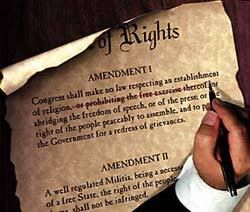
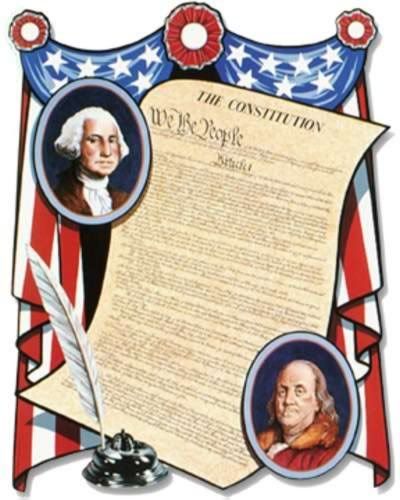
The United States Bill of Rights
The United States Bill of Rights consists of the first 10 amendments to the United States Constitution. These amendments limit the powers of the federal government, protecting the rights of all citizens, residents and visitors on United States territory. Among the enumerated rights these amendments guarantee are: the freedoms of speech, press, and religion; the people's right to keep and bear arms; the freedom of assembly; the freedom to petition; and the rights to be free of unreasonable search and seizure; cruel and unusual punishment; and compelled self-incrimination. The Bill of Rights also restricts Congress' power by prohibiting it from making any law respecting establishment of religion and by prohibiting the federal government from depriving any person of life, liberty, or property without due process of law. In criminal cases, it requires indictment by grand jury for any capital or "infamous crime," guarantees a speedy public trial with an impartial and local jury, and prohibits double jeopardy. In addition, the Bill of Rights states that "the enumeration in the Constitution, of certain rights, shall not be construed to deny or disparage others retained by the people,"[1] and reserves all powers not granted to the Federal government to the citizenry or States.
These amendments came into effect on December 15, 1791, when ratified by three-fourths of the States. Most were applied to the states by a series of decisions applying the due process clause of the Fourteenth Amendment, which was adopted after the American Civil War.
Initially drafted by James Madison in 1789, the Bill of Rights was written at a time when ideological conflict between Federalists and anti-Federalists, dating from the Philadelphia Convention in 1787, threatened the Constitution's ratification. The Bill was influenced by George Mason's 1776 Virginia Declaration of Rights, the 1689 English Bill of Rights, works of the Age of Enlightenment pertaining to natural rights, and earlier English political documents such as the Magna Carta (1215). The Bill was largely a response to the Constitution's influential opponents, including prominent Founding Fathers, who argued that it failed to protect the basic principles of human liberty.
The Bill of Rights plays a central role in American law and government, and remains a fundamental symbol of the freedoms and culture of the nation. One of the original fourteen copies of the Bill of Rights is on public display at the National Archives in Washington, D.C.
The original document proposed by Congress to the states actually contained 12 "Articles" of proposed amendment. However, only the third through twelfth articles, corresponding to what became the First through Tenth Amendments to the Constitution, were ratified by the required number of states by 1791. The first Article, dealing with the number and apportionment of members of the House of Representatives, never became part of the Constitution. The second Article, limiting the ability of Congress to increase the salaries of its members, was ratified two centuries later as the 27th Amendment. The term "Bill of Rights" has traditionally meant only the 10 amendments that became part of the Constitution in 1791, and not the first two, which dealt with Congress itself rather than the rights of the people. That traditional usage has continued even since the ratification of the 27th Amendment.
http://en.wikipedia.org/wiki/United_States_Bill_of_Rights
The Bill of Rights
Amendments to the Constitution of the United States of America
http://caselaw.lp.findlaw.com/data/constitution/amendments.html
List of amendments to the United States Constitution
http://en.wikipedia.org/wiki/List_of_amendments_to_the_United_States_Constitution
1st Freedom of religion, speech, press, petition, and assembly September 25, 1789 December 15, 1791.
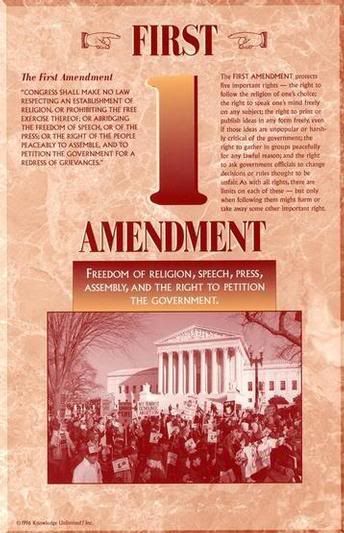
2nd Right to bear arms September 25, 1789 December 15, 1791
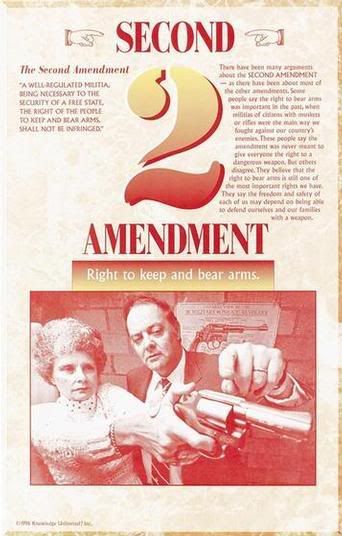
3rd Quartering soldiers in private homes September 25, 1789 December 15, 1791
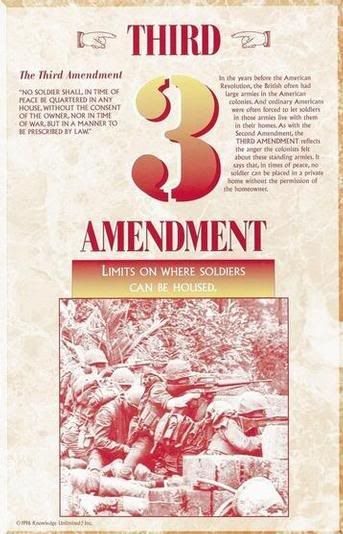
4th Searches and seizures; warrants September 25, 1789 December 15, 1791
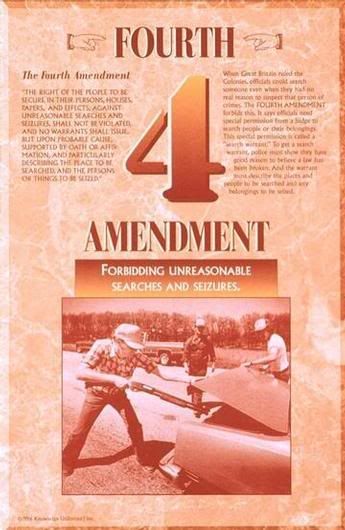
5th Due process; Self-incrimination September 25, 1789 December 15, 1791
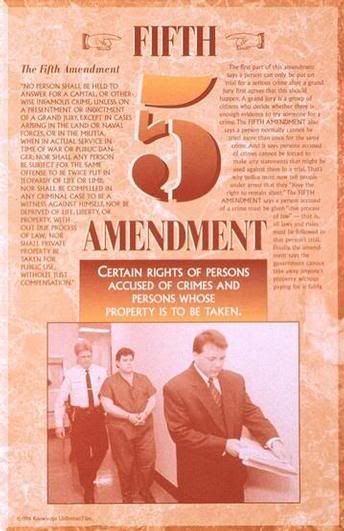
6th Rights of the accused September 25, 1789 December 15, 1791
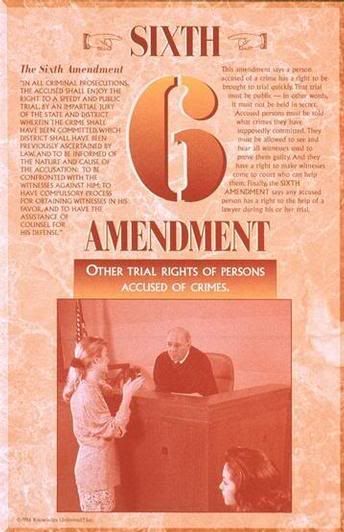
7th Right to trial by jury in civil cases September 25, 1789 December 15, 1791
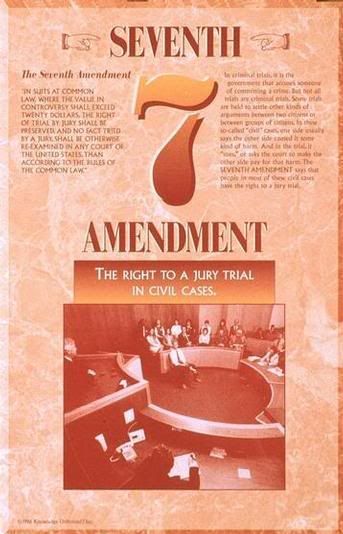
8th Excessive bail & fines; cruel & unusual punishment September 25, 1789 December 15, 1791
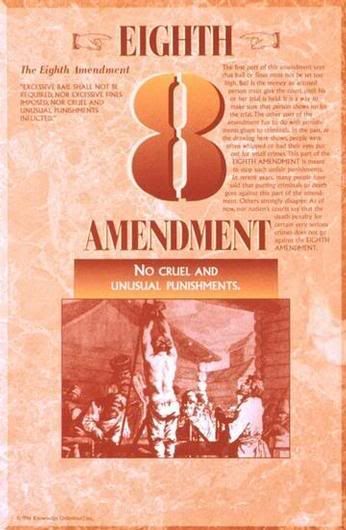
9th Unenumerated rights (not listed rights) retained by the people September 25, 1789 December 15, 1791
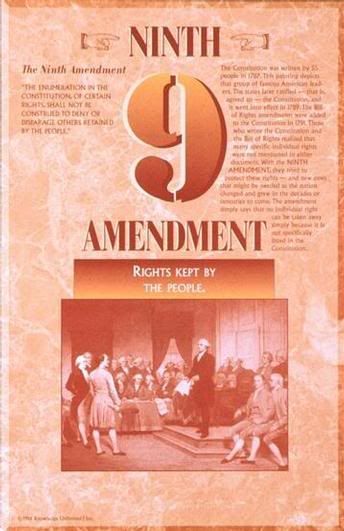
10th Powers reserved to the states or to the people September 25, 1789 December 15, 1791.
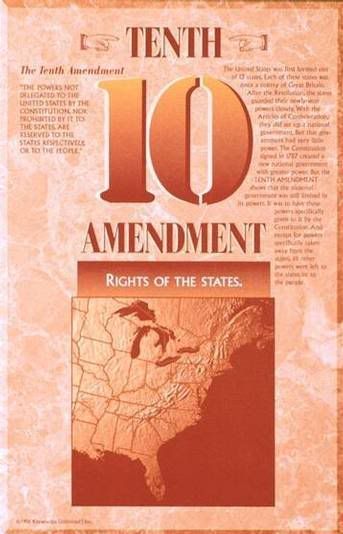
11th Immunity of states to foreign suits March 4, 1794 January 8, 1798 Full text
12th Revision of presidential election procedures December 9, 1803 June 15, 1804
13th Abolition of slavery January 31, 1865 December 6, 1865 Full text
14th Citizenship, state due process, state equal protection June 13, 1866 July 9, 1868
15th Racial suffrage February 26, 1869 February 3, 1870
16th Federal income tax July 12, 1909 February 3, 1913
17th Direct election to the United States Senate May 13, 1912 April 8, 1913
18th Prohibition of alcohol (Repealed by 21st amendment) December 18, 1917 January 16, 1919
19th Women's suffrage June 4, 1919 August 18, 1920
20th Term Commencement for congress (January 3) and president (January 20) March 2, 1932 January 23, 1933
21st Repeal of Eighteenth Amendment; state and local prohibition permitted February 20, 1933 December 5, 1933
22nd Limits the president to two terms March 24, 1947 February 27, 1951
23rd Representation of Washington, D.C. in Electoral College June 16, 1960 March 29, 1961
24th Prohibition of poll taxes September 14, 1962 January 23, 1964
25th Presidential disabilities July 6, 1965 February 23, 1967
26th Voting age lowered to 18 (see suffrage) March 23, 1971 July 1, 1971
27th Variance of congressional compensation September 25, 1789 May 7, 1992
http://www.gpoaccess.gov/constitution/browse.html
Bill of Rights
Countdown: Bush Dissolves The U.S. Constitution Today
"The Constitution is just a piece of paper" - G.W. Bush
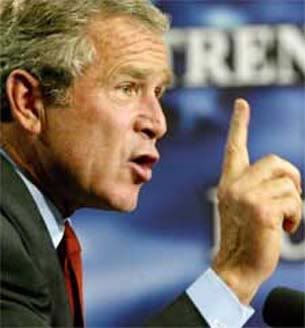
A Material Breach of the Constitution
Bush's War on the Soul of America
by WAYNE MADSEN
http://www.counterpunch.org/madsen02112003.html
It is now time for the U.S. military to act against a dangerous regime that is in material breach of one of the most important legal instruments in the world--the U.S. Constitution. And it is not Sadaam Hussein, Kim Jong Il, or Fidel Castro who threaten the Constitution.
George Bush, Dick Cheney, and every Cabinet member swore an oath to protect and defend the Constitution against all enemies, foreign and domestic. But what happens when the domestic threat is from the very people who swore to defend the Constitution?
The U.S. military, including a large number of Reserves and National Guard are being deployed to the desert sands of Kuwait, Qatar, Jordan and other countries. Their absence from the United States permits the Bush regime to seize more and more constitutional rights of the American people without the possibility of substantial resistance. The only people who are currently defenseless in the world today are the American people--they are vulnerable to the machinations of their own illegal regime.
That leaves only law enforcement as our only real defense. And while most police--Federal, state, and local--seem to be in lockstep with Bush's march towards totalitarianism in the United States, there are now even rumblings from these ranks. Said one local law enforcement officer in the Washington, DC area, "our military reserve personnel are being sent to the Middle East and our ability as first responders is weakened." And this from one Federal law enforcement official, "I can tell you that Bush is heartless."
Hollywood has long pondered, through movies like Seven Days in May, what might happen to America if an extra-constitutional situation were to arise. While most of these cinematic presentations focused on power-hungry generals seizing control from democratically-elected presidents, no one in Hollywood ever really considered the possibility of generals imbued with democratic values ousting a President who was bent on seizing unconstitutional powers. However, this is exactly the nightmarish scenario that is beginning to arise in Washington.
After steamrolling through the U.S. Congress the USA PATRIOT Act at a time when the legislative branch was under an obvious home-grown anthrax attack, the Bush regime is now preparing to drop the other jack boot--the Domestic Security Enhancement Act of 2003 or as it has been dubbed -- USA Patriot Act II. This law would effectively abrogate many of the protections granted by the Bill of Rights and virtually gut the Privacy and Freedom of Information Acts. It is yet another step towards the creation of Bush's maniacal American Empire--one that foresees a final decisive battle between the forces of unbridle corporatism and fundamentalist Judeo-Christianity on one side and Islam, European liberal humanism, social democracy, and pacifism on the other.
Like Roman Caesars Augustus, Tiberius, Caligula, and Claudius, and Napoleon Bonaparte, Adolf Hitler, and Benito Mussolini before him, Bush's fanaticism threatens to plunge the world into endless war and bring to an ignoble close America's 227-year democratic run.
It is perhaps telling that as the Bush regime further curtails the public's right to know, patriots within the U.S. law enforcement establishment chose to leak the "Confidential-Not for Distribution" draft of the "USA Patriot II" Act. Just as Pentagon officials are leaking information on Donald Rumsfeld's inhuman plans to cremate the remains of U.S. troops killed by Iraqi chemical or biological weapons, there are increasing signs that the U.S. government bureaucracy is becoming increasingly restless with the Bush clique. The General Accounting Office, the congressional watchdog agency, fresh from being trounced in its efforts to obtain Dick Cheney's notes on his secretive Energy Task Force, is now conducting an audit of Federal agency compliance with the Privacy and Freedom of Information Acts. This is in response not to Congress, which could not care less about either law, but from government bureaucrats who are apparently blowing the whistle on abuses. It may not result in much of anything, but indicates that there may be a simmering reaction to Bush from one of the most static layers in government--the career civil service.
The career military has just about had it with Rumsfeld's constant paranoia about leaks and his aggressiveness in conducting the type of sweeping investigations of his officer corps and non-commissioned officer ranks that are reminiscent of Richard Nixon's Plumbers Unit.
Anyone who closely examines Patriot II will realize that the document represents the same sort of power grab by Hitler after the Reichstag Fire of 1933. Using the pretext that the Reichstag was burned down by Communists (when, in fact, it was engineered by Nazis), Hitler pushed through the "Decree by the Reich President for the Defense of People and State." The Reichstag Fire Decree, intended only as a "temporary" measure, permitted Hitler and his regime to jail political opponents at will, bypass the judicial system, and eventually force millions of people into concentration camps.
Like the Reichstag Fire Decree, there is nothing really temporary with either Patriot I or II. With a virtual rubber stamp legislature, Bush can simply extend the so-called "sunset" provisions of the first act and any that may appear in the second.
It is also important to point out that much of what is contained in Patriot II is not aimed at effectively defending the United States against terrorists, but at curtailing the freedoms of the American people. In fact, Bush has all but ignored Al Qaeda and Osama bin Laden, choosing instead to pathologically focus on Saddam Hussein.
Attorney General John Ashcroft would be armed with increased powers to curtail the public's access to government information, including information on environmental hazards and other public safety information shared by corporations with the Federal government. And, while the FBI would be able to routinely and without sufficient court order browse the financial records of American citizens, Cabinet and sub-cabinet officers, members of Congress, and Supreme Court Justices could hide from the Internal Revenue Service any fringe benefits deemed to be in the category of "protective security."
In a direct violation of the Tenth Amendment, which states, "The powers not delegated to the United States by the Constitution, nor prohibited by it to the states, are reserved to the states respectively, or to the people," Ashcroft and the FBI will also be able to terminate state laws prohibiting local police from gathering information about people and organizations. These laws were enacted in reaction to past abuses by so-called police "Red Squads" that later were reorganized to keep track of civil rights and anti-war groups.
Further violating the letter and spirit of the Posse Comitatus Act of 1878, the Pentagon would be permitted to conduct DNA dragnets and collect the DNA of "certain classes of aliens including those engaged in activity that endangers national security." Certainly, if DNA technology were available to Hitler, such a decree would have enabled the Gestapo to collect the DNA of Jews, the Roma people, Jehovah's Witnesses, and Africans--all of whom were declared aliens and not Germans under Hitler's racial purification laws.
Elements of racial purification are also contained in Patriot II. The Bush regime would be empowered to take away the citizenship of Americans involved with a "foreign terrorist organization." The Secretary of State is currently authorized the designate, as his whim, what constitutes a "foreign terrorist" organization. It is not just Arab or Muslim-Americans who could lose their citizenship in this respect. In their zeal to ethnically-cleanse America, the Bush regime could eventually withdraw citizenship from Latinos involved with the Colombian FARC or Mexican Zapatistas, Tamil-Americans, Basque-Americans, Irish-Americans, or any American ethnic group that begins to actively oppose, in concert with revolutionary or secessionist movements, America's grand imperial designs in their native lands.
The U.S. government would also be empowered to conduct surveillance of groups active in the United States that are deemed "terrorist" by foreign governments. This would effectively end America's role as a safe haven for pro-democracy organizations fighting repressive regimes that join Bush's coalition for world domination. By not adequately defining what constitutes "material support" for designated terrorist organizations, the Bush regime is coming ominously close to declaring thought crimes to be a national security offense. A web site, which merely expresses support for some group or cause opposed by the Bush cabal, could be shut down and its operators jailed if someone decides it is a threat.
Supported by a sycophantic media, the Bush regime is trying to convince the world that its first war of many is just. But even conservatives like Robert Novak are questioning Bush's Imperial Romanesque plans. In a February 10 column, Novak writes that Bush "projects an American imperium that evokes apprehension among some conservative supporters of President Bush."
Similarly, members of the U.S. intelligence community are pointing to an October 7, 2002 letter from the CIA to the Senate Intelligence Committee. The CIA took issue with the notion that Saddam would engage in a first use of weapons of mass destruction or give them to terrorists like Al Qaeda. The CIA has also dismissed links between Saddam and Al Qaeda, a stance supported by the agency's British counterpart, MI-6.
As evidence of just how far out of step the Bush administration is with the rest of the world, consider the statements of America's traditional allies. Responding to Rumsfeld's Hermann Goering-like bellicosity, Belgian Foreign Minister Louis Michel said, "When one has to take a slap in the face such as the insulting remarks . . . by Mr. Rumsfeld, who comes to teach a thing or two to 'old Europe', the Europe of democratic values, humanist Europe, the Europe of the Age of Enlightenment, personally I find that this hurts." The press aide to Canadian Prime Minister Jean Chretien called Bush a moron. The former German Justice Minister likened Bush to Hitler. Bush insulted his former friend, Mexico's President Vicente Fox, by walking away from a press conference before the translator had finished translating to English Fox's answer to a question. Bush was miffed that Mexico was not supporting Bush in the UN Security Council. He ratchets up North Korea's Kim Jong Il and risks a potential nuclear war by telling a reporter that he "hates" Kim because he starves his own people. Bush refers to Russian President Vladimir Putin as "Pooty Poot" and then expects Russia's support for his Iraq and North Korea adventures--support he unsurprisingly fails to get. Bush calls the Pakistanis "Pakis" and Greek "Grecians." He doesn't know the difference between two incoming NATO members -- Slovenia and Slovakia.
Bush proudly stands on a trash heap of treaties he has rejected either in word or by spirit--Kyoto, Madrid and Oslo, International Criminal Court, Anti-Ballistic Missile, Nuclear Test-Ban, the Biological and Toxin Warfare Convention (BTWC), Convention on the Elimination of All Forms of Discrimination Against Women (CEDAW), Ottawa Convention on Land Mines, and, more recently, the UN Charter and NATO.
Bush's cult-like right-wing supporters begin calling for sanctions against France and Germany. Fine. Thanks to Bush's rants, we already have 100,000 North Korean artillery shells trained on 37,000 US troops and millions of South Koreans. But when the pseudo-moderate Colin Powell calls France and Germany the "Paris-Berlin Axis," he continues the insults of Rumsfeld, who publicly placed Germany in a pro-Iraqi axis with Cuba and Libya. And obviously the Bush war hawks forget one very important thing: by threatening Paris, Berlin, and Brussels, the Bush clique may be the first U.S. administration to force France to think about retargeting its nuclear "force de frappe" strike force, which is complete with sea-to-ground and ground-to-ground intercontinental nuclear missiles. And with Putin now in closer consultation with France, Russia may also feel that it is past time to again focus its nuclear arsenal on a possible conflict with the United States.
Which brings us back to the original concept of Bush's extra-constitutional maneuverings. With an administration that will soon have at its disposal the control over non-auditable computer voting machines across the land, Bushes-in-waiting that will undoubtedly seek higher national office on an endless quasi-monarchical merry-go-round, a compliant Congress run by repulsive demagogues like Tom DeLay, Mitch McConnell, George Allen, Curt Weldon, and Rick Santorum, and virtual dictatorial powers enshrined in the Patriot I and II Acts, there is no relief in sight for America's rapidly fading democracy.
A former British Lieutenant Colonel named George Washington once turned the weapons of his army of rebels against his former masters, thus helping to launch the United States as a free and independent nation. One of Washington's indicted co-conspirators and successors as President, Thomas Jefferson, gave us a blueprint on how to handle the Bush regime: "Governments are instituted among Men, deriving their Powers from the Consent of the Governed, that Whenever any form of Government becomes destructive of these Ends, it is the Right of the People to alter or to abolish it, and to institute a new Government... it is their Right, it is their Duty, to throw off such Government, and to provide new Guards for their future Security."
And just in case the fascists in control of our government contend that the Founding Fathers were part of another era, let us remember some more recent quotes:
"This country, with its institutions, belongs to the people who inhabit it. Whenever they shall grow weary of the existing government, they can exercise their constitutional right of amending it, or exercise their revolutionary right to overthrow it."--Abraham Lincoln.
"I would remind you that extremism in the defense of liberty is no vice. And let me remind you also that moderation in the pursuit of justice is no virtue."--Barry Goldwater.
"For the sake of peace and justice, let us move toward a world in which all people are at last free to determine their own destiny."--Ronald Reagan.
From our Founders to our more recent leaders we have been given the answer to how best deal with the gravest constitutional dilemma that has ever befallen the United States of America. Our modern militia, whose forbearers defended us from the British, pro-slavery secessionists, the Germans, and the Soviet Union, must now defend us once again against all enemies, not foreign but domestic.
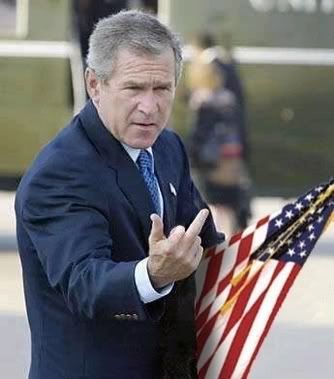
George W. Bush Vs. The Constitution
Prospect: President's Conception Of His Powers Is Dangerous
http://www.cbsnews.com/stories/2006/02/21/opinion/main1334435.shtml
Repeatedly through our history, the liberties guaranteed by the Constitution have been threatened in war by an overreacting government and then reaffirmed in peace by calmer leadership. The Alien and Sedition Acts of 1798, Lincoln's suspension of habeas corpus, the suppression of free speech during and after World War I, the internment of Japanese Americans during World War II, McCarthyism, and the wiretapping of Vietnam-era dissenters — all of these came to be seen, once fears subsided, as violations of our freedoms and embarrassments to our heritage.
George W. Bush's presidency is another era of overreaction at the expense of constitutional rights, but the prospects for a quick correction are not auspicious. Nothing has helped end earlier bouts of repression so much as the fact that the wars themselves came to a close, and nothing has so exposed our liberties to indefinite jeopardy as the conception of a "war on terrorism" with no end.
The president claims an inherent power to imprison American citizens whom he has determined to be this country's enemies without obtaining a warrant, letting them hear the charges against them, or following other safeguards against wrongful punishment guaranteed by the Bill of Rights. Under his administration, the government has engaged in inhumane treatment of prisoners that amounts to torture — and when Congress passed legislation to ban such treatment, he declared he would simply interpret the law his own way. Although the Constitution says treaties are the "supreme law of the land," the president has abrogated them on his own. And, we now know, he ordered a secret program of electronic surveillance of Americans without court warrants.
But there is something more dangerous than any of these specific abuses and usurpations, and that is the theory of inherent powers that Bush invokes to justify most of these actions and the possibility of its being effectively institutionalized by a meek Congress and, worst of all, by a deferential Supreme Court.
My concern is analogous to the one that Justice Robert H. Jackson articulated when he dissented from the majority in Korematsu, the infamous Supreme Court decision in the midst of war (1944) upholding the constitutionality of the military order to intern Japanese Americans. A judicial construction sustaining the program, he wrote, "is a far more subtle blow to liberty than the promulgation of the order itself." For by rationalizing the order, "the Court for all time has validated the principle of racial discrimination in criminal procedure and of transplanting American citizens. The principle then lies about like a loaded weapon ready for the hand of any authority that can bring forward a plausible claim of an urgent need."
The real danger today is the loaded weapon that Bush and his defenders are willing to put in the hands of all future presidents. Even members of his own party ought to be able to see that danger, and act to stop it.
Americans have been slow to react to Bush's actions because the great majority of them no more identify with the Arabs who are the chief targets of the "war on terrorism" than the majority in the 1940s identified with their fellow citizens of Japanese descent. But the principles that Bush is undermining protect us all. Our Constitution divides the president's authority with Congress and the courts so as to create a system of mandatory consultations. That requirement does not make injustice and misuse of power impossible, but it makes them less likely. To survive, the system chiefly requires that if those in power cannot remember our traditions, they can at least imagine themselves out of power in the future.
Not long ago, the Supreme Court could have been counted on to restore the checks that Bush has thrust aside. But the confirmation of the president's two nominees to the Court may now tilt it in his direction. The common element in the background of the new justices is not merely their political conservatism, but their history of support for a broad construction of executive powers.
The combined effect of a changed court and a putative state of perpetual war could radically distort our whole constitutional framework. An increasing number of congressional Republicans have recently expressed doubts about the legality of Bush's surveillance program. The real battle, however, is about general principles applied across a wide range of policies. Of course, if the voters elect a Democratic president in 2008, perhaps even the Court's new justices may discover constitutional reasons to limit the president's inherent powers. I am not saying this is the only hope. But in a democracy, those who cannot imagine being out of power deserve another experience of being without it.
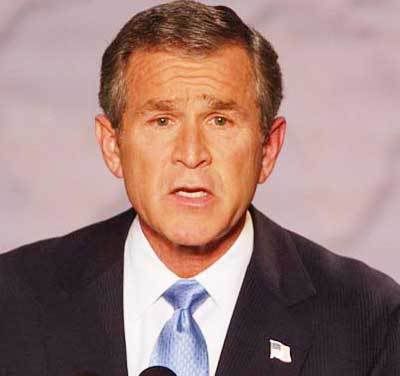
In the late 19th century, British war correspondent and novelist Rudyard Kipling observed, "The first victim of war is truth." Today, it's even worse. The first victim of George Bush's so-called war on terror is the Constitution.
http://www.metrowestdailynews.com/opinion/x1508842499
Ever since Sept. 11, George Bush has acted as if he's above the law: eavesdropping on our phone calls without a court order; prying into our medical and credit-card records without a search warrant; setting up a secret network of torture chambers around the world; and, most notoriously, rounding up suspects and detaining them for years without charging them with any crime or putting them on trial. Finally, a federal court has said: Enough's enough.
Ali al-Marri, a native of Qatar, living in this country on a student visa, was arrested three months after Sept. 11, suspected of being a sleeper agent for al Qaeda. He was declared an "enemy combatant" - which, according to the post 9/11 dictatorial powers adopted by Premier Bush, means al-Marri has no rights under either American law or international law.
But, wait a minute. This is the United States of America, not the Soviet Gulag. We're a nation of laws. We don't throw people in jail and hold them forever without telling them what crimes they're charged with, do we? Well, we never did before, but under George W. Bush, we do. For the last four years, al-Marri has been held at the Navy brig in Charleston, S.C. - denied the right of counsel or the opportunity to defend himself in court, even though no charges have been filed against him. But soon, no longer.
In a stinging rebuke, a conservative federal court in Richmond, Va., told the Bush administration they were acting illegally. If they have any evidence that al-Marri came to the United States to help al Qaeda, they have to prove it in court. Otherwise, they have to let him go. "The government cannot subject al-Marri to indefinite military detention," wrote Judge Diana Gribbon Motz for the U.S. Fourth Circuit Court of Appeals. "For in the United States, the military cannot seize and imprison civilians - let alone imprison them indefinitely."
But what about the war on terror? Doesn't that change everything? Not at all, said the court. Even after Sept. 11, the Constitution still applies. Read the Sixth Amendment. No matter what George Bush calls him, even a foreign national, living legally in the United States, has the right "to be informed of the nature and cause of the accusation; to be confronted with the witnesses against him; to have compulsory process for obtaining witnesses in his favor; and to have the assistance of counsel for his defense."
Just when it looks like we're in danger of losing everything, the Fourth Circuit's opinion is a great blow for liberty that should be welcomed, and defended, by liberals and conservatives alike. As long as the president is free to deny legal protection to someone in this country, simply by labeling him an "enemy combatant," he could do the same to any one of us. Warns Judge Gribbon Motz: "To sanction such presidential authority to order the military to seize and indefinitely detain civilians, even if the President calls them 'enemy combatants,' would have disastrous consequences for the Constitution - and the country."
The court's decision is also important because of its far-reaching implications. Although the ruling is limited to the case of Ali al-Marri, its logic applies to all extra-legal measures justified by the Bush administration as necessary actions in its war on terror. If it's wrong to detain al-Marri indefinitely, then, for the same reasons, it's wrong to detain 400 prisoners at Guantanamo Bay. It's wrong to torture prisoners of war. It's wrong to tap our phones without a warrant.
By ruling against the Bush administration in its treatment of Ali al-Marri, the Fourth Circuit Court of Appeals actually said something revolutionary - "revolutionary," as in one of the reasons we fought the Revolutionary War. And what it said is this: We are not a monarchy. Even in the middle of a war, our government must obey the law. And we can fight a war on terror and obey the law at the same time.
God bless America! In these days of wanna-be King George, it's nice to know somebody's keeping an eye on the Constitution.
Keith Olbermann: Military Commissions Act of 2006
Keith Olbermann of MSNBC's Countdown did a great report on what the recently passed Military Commissions Act of 2006 means to America and our Constitution.
Bush lies and threatens the Constitution,
The Constitution in Crisis
Bill Maher - Civil Liberties
Civil Liberties

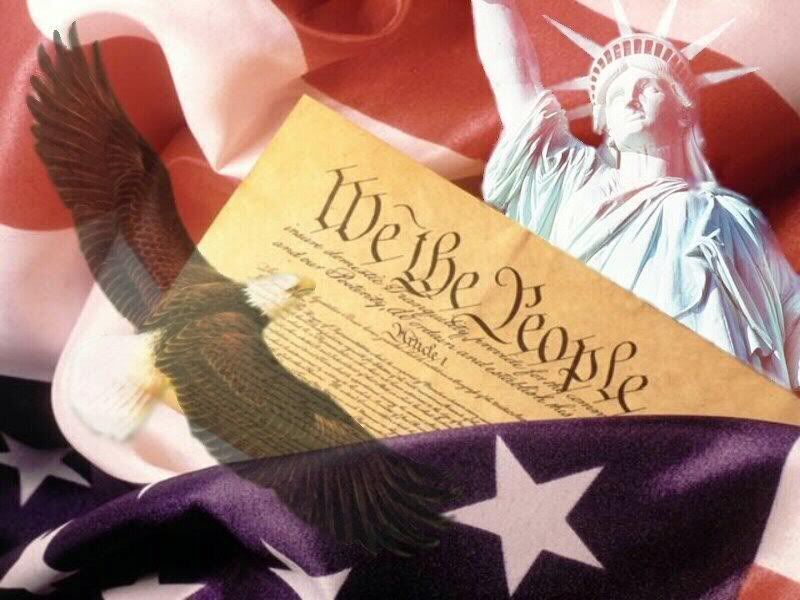












![Brotherhood" (2006) [TV-Series]](http://photos1.blogger.com/x/blogger2/1421/379621144723082/211/z/425926/gse_multipart33129.jpg)







No comments:
Post a Comment